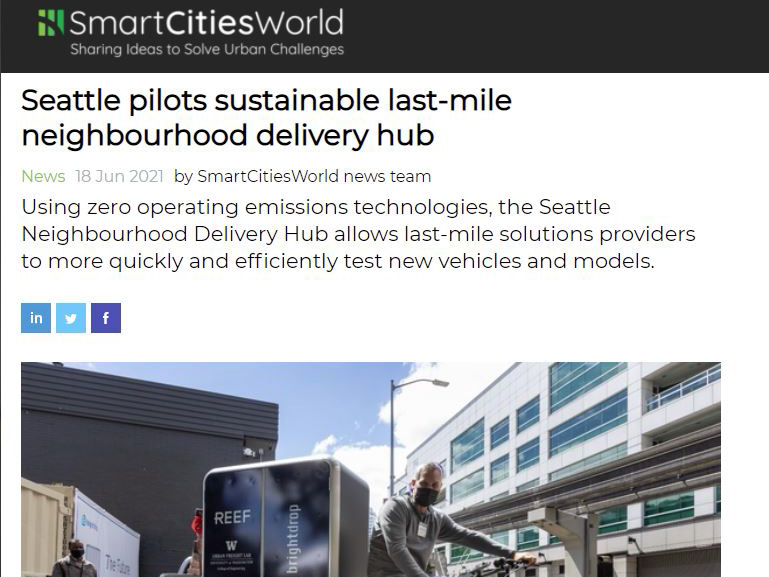
By SmartCitiesWorld news team
Using zero operating emissions technologies, the Seattle Neighbourhood Delivery Hub allows last-mile solutions providers to more quickly and efficiently test new vehicles and models.
The University of Washington’s Urban Freight Lab (UFL) has launched and deployed what it claims to be one of the nation’s first zero operating-emissions, last-mile delivery pilots in the uptown neighbourhood of Seattle.
It is working in collaboration with the Seattle Department of Transportation (SDOT) and tech and a number of delivery companies including AxleHire, Coaster Cycles, BrightDrop, and Reef.
Last-mile solutions
Using zero operating emissions technologies, the Seattle Neighbourhood Delivery Hub allows last-mile solutions providers to more quickly and efficiently test new vehicles, delivery models, and technologies – all in service of getting new eco-friendly solutions to market more quickly.
These technologies are an important part of the City of Seattle’s strategy to reduce climate emissions outlined in its Transportation Electrification Blueprint, including the goal of transitioning 30 percent of goods delivery to zero emissions by 2030.
“In partnership with our members, and the City of Seattle, the Urban Freight Lab is excited to help catalyse a transition to zero-emissions last-mile delivery,” said Anne Goodchild, founding director, supply chain transportation and logistics centre, which houses the Urban Freight Lab, and professor, civil and environmental engineering, University of Washington.
“We anticipate the pilot will reduce traffic in the uptown neighbourhood, provide access to safe and convenient goods and services, and allow our partners to test novel, zero-emissions delivery solutions.”
The neighbourhood delivery hub houses:
- a neighbourhood kitchen, bringing the local area quick and low-emissions access to some of their favourite delivery restaurants
- a common-carrier parcel locker, providing neighbours secure and contactless package delivery from all major package carriers in an energy-efficient model, enabling neighbours to complete their own final mile
- a cargo-bike delivery service enabling zero operating emissions last-mile goods transport by safe, neighbourhood friendly vehicles.
The neighbourhood delivery hub and associated transport modes are equipped with an array of sensors that provide detailed data regarding activity. Hub sensors are provided by the University of Washington’s Star Lab, a research facility for intelligent transportation systems (ITS) theories and applications.
This data will be analysed by the UFL to evaluate energy reductions and provide feedback for all participants as they work to improve their products and operating models.
How it works
In an effort to reduce roadway congestion and sidewalk obstructions, Reef provides a fully off-street staging location where goods can be transferred from delivery vans to cargo bikes. Goods are loaded into BrightDrop’s EP1 units and the electric pallets are secured onto Coaster Cycles’ Electric Cargo Trike.
Using AxleHire’s last-mile delivery technology, the driver makes customer deliveries using the fastest, most efficient routes possible. Reef’s ghost kitchen takes orders for food delivery that might otherwise have been fulfilled by restaurants farther away from the delivery area and fulfills them in the neighbourhood.
The common carrier parcel locker, developed by ParcelPending and hosted by the UFL, provides delivery density for carriers (they visit one location instead of multiple addresses), and neighbours can walk to the site at their convenience to pick up packages, completing their own last mile. The combination of activities allows each operator to provide clean, neighborhood scale services cost effectively.
“Over 60 per cent of Seattle’s greenhouse gas emissions comes from transportation, so we must change how we move around”
—Sam Zimbabwe, director, Seattle Department of Transportation
The Seattle Department of Transportation (SDOT) is working to create more sustainable options for people, goods and services to move around our city and is supporting the pilot by authorising the commercial use of public streets, kerb space and sidewalks.
Goals outlined in the City’s Transportation Electrification Blueprint include that 30 per cent of goods will be delivered by zero-emissions vehicles by 2030. “Over 60 per cent of Seattle’s greenhouse gas emissions comes from transportation, so we must change how we move around in order to meet our commitment to become carbon neutral by 2050,” said Sam Zimbabwe, director, Seattle Department of Transportation.
“Rethinking how we deliver goods is a critical part of this, so we are excited to partner with University of Washington’s Urban Freight Lab and the private sector to find innovative solutions to meet our aggressive targets towards a more sustainable future.”